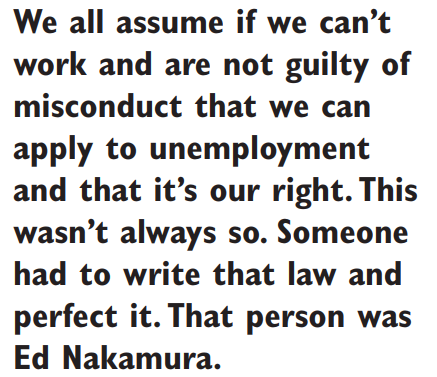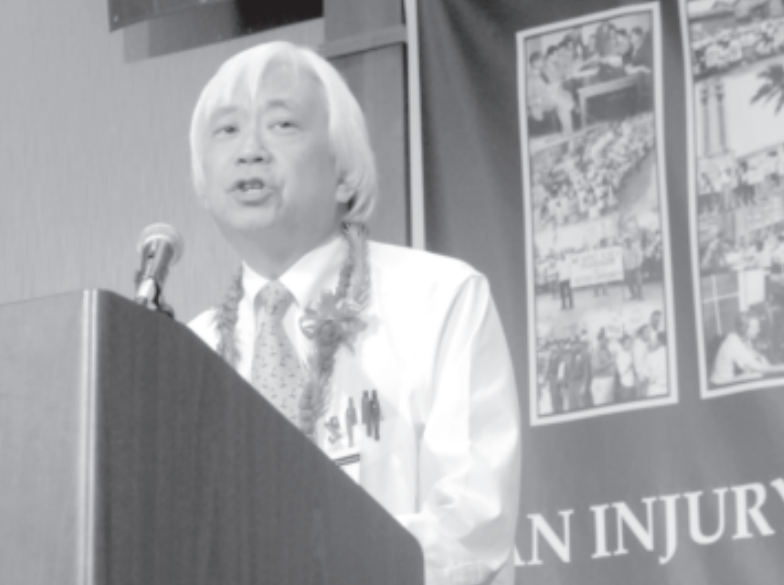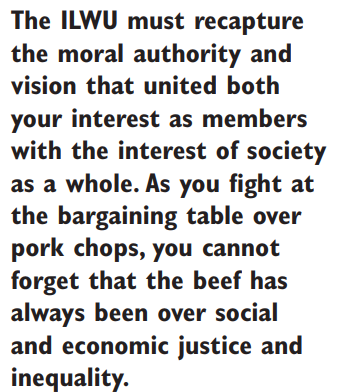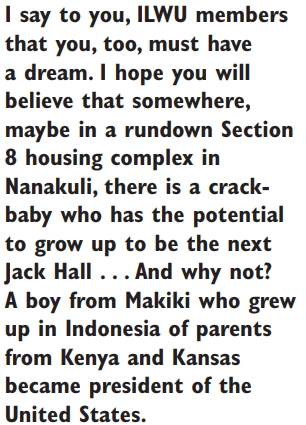The following was presented by Convention guest speaker Lowell Chun-Hoon. Chun-Hoon is a partner of the law firm King, Nakamura and Chun-Hoon, which has defended the union and union members since the 1940s.
It is a real part of the strength of this union that you have political leaders like President Obama, Senators Inouye and Akaka . . . who support ILWU Local 142 and appreciate the contributions you and your union have made to Hawaii. A huge part of these contributions is celebrated in Tom Coffman’s superb biography of Ed Nakamura: I Respectfully Dissent. I’d like to talk today about this book, about Ed Nakamura, and what I think the book and Ed’s life means for the ILWU today.
That’s great that the ILWU transformed Hawaii from a feudal society dependent on sugar cane production into a multiracial democracy: but what have you done for me lately? What is the union doing NOW besides collecting dues? These are questions we cannot ignore. It is far too easy to become complacent and to do what we do: worry about hanging on to our wages and our pensions; try to educate our children; care for our aging parents; pay our mortgages, if we’re lucky enough to have a home.
The world has changed. The sugar plantations are closed. Mechanization is the wave of the future on the docks. So if the world has changed so much, why should we give a rip about Ed Nakamura, who retired in 1989 and died in 1997, and Tom Coffman’s book?
I Respectfully Dissent is a soaring story of a waiter’s son who rose through McKinley High School, the University of Hawaii to fight fascism in Europe and imperialism in East Asia for the star and stripes. But it is also and more importantly the saga of a quiet and determined man who truly listened to the rank and file, and was responsive to what they needed by rearticulating their concerns and turning them into law.

I Respectfully Dissent chronicles Ed’s legislative genius in the evolution of temporary disability, unemployment and workers’ compensation benefits, and pre-paid health insurance . . . how he saw and cared about obscure details like unemployment taxes assessed against employers and how these taxes affected the solvency of unemployment insurance fund-things that are absolutely vital to the economic security of workers out of jobs, but totally unglamorous. And perhaps one of the greatest marks of Ed’s success is that we now take completely for granted so many of these protections that he put into law, with supportive legislators and the ILWU.
We all assume if we can’t work and are not guilty of misconduct that we can apply to unemployment and that it’s our right. This wasn’t always so. Someone had to write that law and perfect it. Someone had to worry that there was enough money in the unemployment insurance trust fund so that there would be enough funds to take care of the unemployed when times were bad, and that employer’s weren’t overtaxed when times were good.

ILWU attorney Lowell Chun-Hoon speaks at the 26th ILWU Local 142 Convention.
That person was Ed Nakamura. Did you ever wonder what happened if you were in an industrial accident and never worked again for the rest of your life? You probably know you can get a fixed amount of weekly payments for permanent total disability. Do you know that there is protection against inflation and the rising cost of living in these benefits? Today, workers in Hawaii who are permanently totally disabled have a benefit adjustment that’s paid to them every ten years that helps them with the cost of living. Do you know whose idea it was that there be such an adjustment? Right: it was Ed Nakamura and he drafted a provision in 1980 to solve that problem.
What I find most inspiring is not that Ed was a brilliant jurist and labor lawyer, which he was, that he rose from modest circumstances to Hawaii’s highest court, which he did, or even that he spent an entire lifetime devoted to the welfare of the common person. What I find most inspiring is that he found a way to harness his ideas with the ideas of actions and others, . . . and so many others of you. Ed was . . . part of a tsunami of change that propelled an entire generation of workers forward, transforming the society around him to one that was more equal in opportunity, where the fruits of labor were shared by many, not hoarded by few.
What is the lesson for us today of Ed’s life and Coffman’s book?
The ILWU must recapture the moral authority and vision that united both your interest as members with the interest of society as a whole. As you fight at the bargaining table over pork chops, you cannot forget that the beef has always been over social and economic justice and inequality. One percent of the country is robbing the ninety-nine percent blind, and it is time we all opened our eyes to see this theft for what it is.
There should be a Union Springtime, like the Arab Spring in the Middle East, and the Thousand Flowers Movement in Mao’s China, where the voices of the many are finally heard and honored
This will involve events like the protest staged by longshoremen against the wars in Afghanistan and Iraq on May 1, 2008 when they refused to unload cargo at 29 West Coast ports. It will involve quiet discussions between men and women and the baring of intimate private thoughts, and candid words not only about policies and actions, but also the exploration of personal feelings and emotions about equality between the sexes.
I would like to voice a few suggestions about what the future aspirations of the union should be. There should be a focus, I think, on domestic violence, human trafficking, and lending a hand to assist those immigrants who remain vulnerable and needy. In my view, this will focus us all on three things: 1) our relationship with one another as men and women, 2) some of the worst abuses and exploitation against labor in our society, and 3) the needs of other marginalized and oppressed groups, whose incorporation can revive the union.

We all have families. Domestic violence is really about how we treat those who are most intimate with us, and it is more broadly reflected in society. Can we really expect to have peace among nations, if there is no peace in the home? Can we really hope that nations and armies will curb their appetite for war, when we ourselves cannot restrain our impulse for violence and maintain peace in our own homes?
Some figures say that as many as 27 million people have been subjected worldwide to human sex and labor trafficking. How can we as a union and upholder of the rights of working people stand idly by in the face of such monumental exploitation? Thai workers at Aloun Farms have been sold into debt bondage and were living in Matson cargo containers. What have you and I done to stop that miscarriage of justice?
What about the local girls recruited by pimps from Pearlridge Mall to prostitution? A grandfather from Hilo testified in 2010 in the legislature that his 15 year old granddaughter was kidnapped from her home in Hilo, so she could be sold into prostitution on the mainland, but fortunately a local grassroots search found the girl before she was shipped across the Pacific. When the story was made public in Hilo, the grandfather got calls from six other families who said they had similar experiences. Only two, just two of those families, however, said they were as lucky as this grandfather to get their daughters back. Four young women, somewhere, had their lives stolen and were consigned to sexual slavery.
Finally, you should come to the aid of recent immigrants to our shores, to Southeast Asians, Micronesians, Samoans and Tongans. American foreign policy and wars have uprooted many of these peoples, in some cases subjecting them to devastating nuclear radiation, and often deformed their traditional cultures. These newcomers have the same problems as your parents and my grandparents. Organize them and welcome them to our union. Aid, educate, and accommodate them, and they will repay us, renew our society and our economy, and reinvigorate the promise of America.
I mentioned the union needs to be concerned about building multinational alliances and to be concerned about exploitation around the globe. If you’ve studied your constitution, this is old news. Your constitution says in the preamble that this union is devoted “to advance the living standards of our fellow workers everywhere in the world . . . to banish racial and religious prejudice and discrimination, to strengthen democracy everywhere and achieve permanent peace in the world.” In Declaration of Principles #11 your Constitution commits “[T]o fight all violations of democracy” and to “reject racial, religious, sex or political discrimination by anyone.”
The greatest, untapped resource you have is each other and the common vision of hope and transformation we can build together. Ed Nakamura built that vision of hope through laws and legal decisions, but it was a vision based on his belief in all of you as workers and your collective power in a democratic society.

We all know that Martin Luther King had a dream and it enriched the United States of America. I say to you, ILWU members that you, too, must have a dream. I hope you will believe that somewhere, maybe in a rundown Section 8 housing complex in Nanakuli, there is a crack-baby who has the potential to grow up to be the next Jack Hall
lieve that there is another child growing up in Ilocos Norte who will emigrate to Hawaii and use Facebook, Twitter, and other social media to create an unbreakable, irresistible electronic alliance of union members, united around the globe who stand for equality, opportunity, peace and justice. And why not? A boy from Makiki who grew up in Indonesia of parents from Kenya and Kansas became president of the United States.
In the end, what’s said at this podium isn’t really what’s important. What will matter, when we’re all long gone, is that you will have carried on a proud, progressive tradition. You took your turn, as Ed Nakamura did, and stood up, spoke out, and insisted on addressing the injustices and inequalities of your time. You knew that nothing should be taken for granted, and that each generation must fight and win this battle anew to realize its dreams-so that the people, not the bosses, rule the country and the planet.
And you will prove, through your actions—as you rise up as one in defense of all humanity—that an injury to one, truly is an injury to all!

Summary of Resolutions Adopted
The 26th Convention adopted twentyfive resolutions which state the policy and programs of ILWU Local 142. Following are summaries of these resolutions.
R-1 Resolution on the 60th Anniversary of Consolidation of ILWU Local 142
That the 26th Convention of the ILWU Local 142 salutes the wisdom and foresight that led to the formation of consolidated ILWU Local 142. It has carried us for the last 60 years in strength, unity and solidarity. The ILWU Local 142 is resolved to take the same visionary approach that consolidated this union as one and modernize the union to carry us into the next 60 years.
R-2 Resolution in Support of Organizing
The ILWU Local 142 reaffirms its commitment to organizing the unorganized. ILWU rank and file members assist in the organizing effort by identifying organizing targets, talking to potential new members about the benefits of unionism, and encouraging them to join the ILWU.
R-3 Resolution in Support of Hawaii Longshore Negotiations
The Convention strong supports Hawaii Longshore Division in its 2014 negotiations. Safety is a big issue for longshore workers with container terminals being seriously congested. Longshore workers work long hours all day and into the night, working under artificial light and required to have particular skills. The Longshore deserve their compensation and must be protected.
R-4 Resolution in Support of the Jones Act
Matson, Horizon, and Pasha are all Jones Act vessels owned by United States companies, whom have served Hawaii for over 100 years, regardless of profit. Foreign companies have no ties or loyalty to Hawaii. Their interest to call and service Hawaii is in profit margins. They have the power to delay or stop services altogether based on those profit margins. Allowing foreign companies to service Hawaii, will allow for noncompliance with United States Federal Environmental and Labor laws, as well. Hawaii could see trash dumping, oil spills, and foreign workers paid well below the minimum wage. As a labor union that stands for a sustainable Hawaii and fair working conditions and wages, supporting the Jones Act goes without question.
R-5 Resolution to Reaffirm Support for Pacific Beach Hotel Workers and Their Continuing Struggle for a Union Contract
Local 142 and its members at Pacific Beach Hotel expresses sincere appreciation to Zenkowan, ITF, JTUC-RENGO, Service Rengo and more than 20 supporting unions in Japan and other international unions and federations for their demonstration of international solidarity. The Convention reaffirms its strong support for the workers of Pacific Beach Hotel and will continue to actively promote the boycott of Pacific Beach Hotel until the workers win justice and a fair union contract.
R-6 Resolution in Support of Lanai and Its New Beginnings
Support the new ownership of Lanai and the hope of prosperity for the ILWU members on Lanai.
R-7 Resolution in Support of Clean Energy and a Statewide Grid
Hawaii residents pay the highest rates for electricity in the nation, largely due to dependence on imported oil, which is costly, environmentally unfriendly, and often unreliable due to it’s origin. Hawaii set a clean energy goal that, by 2030, 70% of the state’s energy needs would be met through energy efficiency measures (30%) and locally generated renewable resources (40%). The ILWU Local 142 supports the development of a statewide electricity grid through installation and implementation of an interisland electric transmission cable system, as well as, the development of renewable energy resources on all islands as an economic driver.
R-8 Resolution in Support of the Patient Protection and Affordable Care Act
The U.S. Supreme Court recently upheld the Patient Protection and Affordable Care Act, which was signed into law by President Obama on March 23, 2010. The Affordable Care Act, as it is often known, is intended to move the nation toward universal health care coverage, significantly reducing the number of uninsured Americans from a current high of 50 million. The ILWU Local 142 urges Hawaii’s Congressional delegation to support its continuation. The convention calls for members to educate themselves about the benefits of the Act.
R-9 Resolution in Support of the United Way and Labor’s Community Services Program
The ILWU has supported the United Way not only because of the breath of services supported by fundraising dollars but because of a unique partnership between the United Way and the AFLCIO. The ILWU Local 142 supports the United Way organizations on all islands for its efforts to raise funds for nonprofit agencies that provide services to the community. ILWU members, staff and full-time officials are encouraged to contribute to the United Way. The ILWU strongly supports the Labor’s Community Services Program and its Labor Liaisons.
R-10 Resolution to Support ILWU Oral History
Through the ILWU Memorial Association and a grant from the Ah Quon McElrath Fund for Economic and Social Justice, the Union is embarking on recording the oral histories of union leaders and rank and file members and retirees. If not recorded now, these stories will be lost to future generations. The ILWU strongly supports this project and members and retirees are encouraged to actively participate when asked to provide their oral history.
R-11 Resolution to Support Credit Unions
Credit unions utilize profits to promote our local economic growth here in Hawaii
The democratic process of credit unions allows for members to have a voice in how the credit union is run. The flexibility of credit unions allows for the union to work with members, despite a troubled financial past or not being able to get credit elsewhere. The ILWU continues efforts at all levels of the union to educate and involve rank and file in supporting ILWU credit unions.
R-12 Support ILWU Tourism Workers Negotiating for Fair Contracts
In these next three years, over 7,600 members who work in hotels and golf courses will be negotiating new labor contracts. Fifteen ILWU Local 142 hotels with 2,563 members are negotiating new contracts this year in 2012. Grand Wailea, our largest concentration of hotel membership will be going into negotiations in 2013.
The ILWU stands in solidarity with their brothers and sisters in these hotels and encourage those who visit Hawaii to use the ILWU Restaurant Guide to patronize the restaurants our brothers and sisters serve.
R-13 Resolution to Support the Viability of Sugar Cane Production in Hawaii
For more than a century, sugarcane was the principal crop grown in Hawaii. The ILWU supports sugarcane production and Hawaiian Commercial & Sugar Company, the last sugar plantation in Hawaii. The ILWU will urge the Commission on Water Resource Management for a fair allocation of water that will allow HC&S to survive. Members of the ILWU and their families will promote, buy and use sugar produced in Hawaii.
R-14 Resolution in Support of Agriculture Workers
The International Longshore and Warehouse Union Local 142 supports the continuation of sugar, pineapple, coffee, macadamia nut, and other agricultural production in Hawaii and pledges to maintain them as viable industries. ILWU Local 142 salutes sugar, pineapple, coffee, macadamia nut, and other agriculture workers and recognizes the great contribution made by these workers to the ILWU and the union movement.
R-15 Resolution on ILWU Political Action Program
Everyone eligible must be registered to vote. ILWU political action means supporting endorsed candidates, including canvassing, sign-waving, attending fundraisers and helping with campaign literature. Absentee voting is quick, easy and free. Every member and retiree is urged to vote and get others to vote in this year’s important General Election.
R-16 Resolution in Support of the Health and Welfare Trusts
The Tourism Health and Welfare Trust Fund has proven to be a great benefit for many of our members and for the hotels as well. Our members pay nothing for their medical coverage, as the hotels pay 100 percent of the cost of the medical plans. An equal number of union and management trustees control the Trust Fund so we can customize the medical plan to fit our members’ needs.
The Trust Fund has direct control over a claims administrator, HMA, which pays the hospitals, doctors, and medical providers. This helps manage costs and
—continued on page 6
